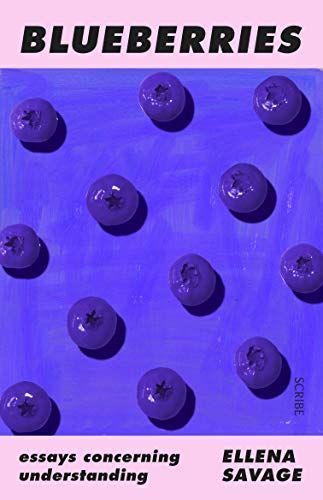
Blueberries Essays Concerning Understanding
'I mean who cares about opinions, gossip, whatever, when bodies are so vulnerable, in search only of love and breath.' The body frequently escapes her, but is always very much present in these compellingly vivid, clear-eyed essays on an embodied self in flight through the world, from the brilliant young writer Ellena Savage. In Portuguese police stations and Portland college campuses, in suburban Melbourne libraries and wintry Berlin apartments, Savage shows bodies in pain and in love, bodies at work and at rest. She circles back to scenes of crimes or near-crimes, to lovers or near-lovers, to turn over the stones, re-read the paperwork, check the deeds, approach from another angle altogether. These essays traverse cities and spaces, bodies and histories, moving through forms and modes to find a closer kind of truth. Blueberriesis ripe with acid, promise, and sweetness.
Reviews
lily lily @lilyanyways
Dora Tominic@dorkele
Isabella @iscbella
Rebecca Lum@reblum
azliana aziz@heartinidleness
Deyana@dawndeydusk
Lucy Newlinds@lucynewlinds
Jales@jales
Linn @moonriver
saaral@kaadhalsaaral
Eva Cace@evaluna
sea@snoozefm
Luc @luckyluc
Madison marlow @maddiemar
Nabila Azahra@nabilazhhr
Elena Kuran@elenakatherine
Cassie B@partialtruth
Sarah McGrath@sarahmc
Jesse Morley@jessemorley
Taylor Conacher@taylorana
Iris Emily@desirepath
Katja@amnesia
Jasmine Bilham@jasminebilham
Highlights
kite@blessings
lily lily @lilyanyways
Rebecca Lum@reblum
Page 205
Rebecca Lum@reblum
Page 203
Rebecca Lum@reblum
Page 198
Rebecca Lum@reblum
Page 156
Rebecca Lum@reblum
Page 177
Rebecca Lum@reblum
Page 204
Rebecca Lum@reblum
Page 199
Rebecca Lum@reblum
Page 156
Rebecca Lum@reblum
Page 150
Rebecca Lum@reblum
Page 146
Rebecca Lum@reblum
Page 98
Rebecca Lum@reblum
Page 68
Rebecca Lum@reblum
Page 58
Rebecca Lum@reblum
Page 55